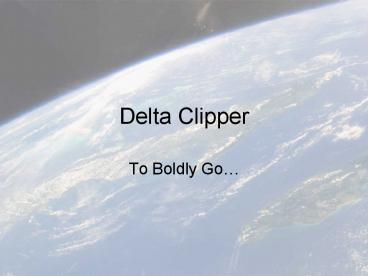Delta Clipper - PowerPoint PPT Presentation
1 / 23
Title:
Delta Clipper
Description:
... cost estimates based on the Shuttle result in an unaffordable system ... Shuttle Orbiter is designed for a 2-week ground turnaround, from landing to relaunch. ... – PowerPoint PPT presentation
Number of Views:81
Avg rating:3.0/5.0
Title: Delta Clipper
1
Delta Clipper
- To Boldly Go
2
A presentation by
- Jason Moore
- Ashraf Shaikh
3
How do we get there now?
- Space Shuttle
- Partially reusable
- Multi-stage
- Manned
- 500 Million / Launch
Picture courtesy of NASA
4
How do we get there now?
- Titan IV, et. al.
- Single use
- Multi-stage
- Expensive
- Long build time
Picture courtesy of NASA
5
A need for something better
- Current vehicles suffer from a few drawbacks.
- They are expensive to build and maintain.
- Multi-stage rockets require large uninhabited
areas for stage recovery/disposal. - It takes many months to prep the Shuttle or build
a new expendable vehicle. - Large specialized space ports are needed to
launch these vehicles.
6
A solution from the past
- SSTO Single Stage to Orbit
- RLV Reusable Launch Vehicle
- Aerospace engineers have been working on this
problem for years it has been a dream for many
in the industry.
Picture courtesy of Space Merchants Inc. and G.
Stine
7
A few noble attempts
- Early vision for what the Space Shuttle was to
have been - NASA investigated the possibility of building a
fully reusable shuttle - Due to compromises with Congress, as well as
then-current technology limitations, the Shuttle
designers had to pick a staged design.
8
A few noble attempts
- X-33
- Subscale Technology Demonstrator
- NASA budgeted 941 Million for the project
- No powered prototype ever flew
- Vertical takeoff, Horizontal landing
configuration - Full scale version dubbed VentureStar
9
A few noble attempts
- X-37
- Technology demonstrator
- Designed to validate concepts and designs for a
future Orbital Space Plane - OSP not intended to be fully reusable
- Stop-gap measure while more time and money is
spent studying a true RLV - So far NASA has only done drop tests and
structural tests
10
Faster, Better, Cheaper
- Delta Clipper
- Originally completed in 1993 as the DC-X
- Joint venture between the Air Force and McDonnell
Douglas - Intended as a one third scale prototype of a RLV
proposed by the Strategic Defense Initiative
Organization
Picture courtesy of NASA
11
Faster, Better, Cheaper
- A primary goal of the Delta Clipper project was
to show that an RLV could be operated in a manner
similar to a commercial airliner.
Pictures courtesy of NASA
12
Faster, Better, Cheaper
Picture courtesy of NASA
Picture courtesy of McDonnell Douglas
- Compare the mission profiles of the Space Shuttle
and a Delta Clipper.
13
Faster, Better, Cheaper
- DC-X Program
- Built in 21 months for 60 Million by a team of
100 - USAF completed 8 test flights
- During flight 5 the vehicle demonstrated its
autoland capability, an important safety feature - Built almost entirely of off the shelf parts
Picture courtesy of NASA
14
Faster, Better, Cheaper
- DC-XA
- Delta Clipper program acquired by NASA
- NASA installed experimental fuel tanks and a
better reaction control system, saving 620
kilograms of weight - 4 Test flights were completed, as well as 2
static engine tests
Picture courtesy of NASA
15
A path to the future
- A private organization should build an RLV based
on the Delta Clipper experimental rocket. - A full scale Delta Clipper would be a SSTO launch
vehicle. - Goal for the project will be to build a vehicle
which can be operated much like a commercial
airliner, and drastically reduce the cost of
putting a payload into orbit.
16
Whose mission should this be?
- NASA should be a consumer of launch services, not
a supplier. - Bureaucracy gets in the way. DC-X an example of
unhindered engineering. - NASAs Mission Statement
- To understand and protect our home planet
- To explore the Universe and search for life
- To inspire the next generation of explorers
- as only NASA can.
17
What will it be used for?
- Smaller and cheaper satellites. More advanced
technology in orbit due to faster and cheaper
access to space. - Space Station construction payload ferry.
- Space tourism
- Global Express
- Moon exploration
18
Why hasnt this been done?
- It has.
- The DC-X.
19
Why hasnt the project been completed?
- Lack of support from Congress
- Misinformation
- Wrong culture at NASA (not a corporate culture)
- NASA too busy with Shuttle and its many
explorative missions - NASA prefers to study new technologies, where as
the Delta Clipper would require little new
technology
20
Why not just build the VentureStar?
- The Delta Clipper has flown. It doesnt rely on
cutting edge technology. - The first stage of most development programs, the
proof-of-concept prototype, has already been
built and tested. - Versatility. A modified Clipper could make a trip
to the moon, land on the surface, and return to
Earth. - Safety features. Powered engine-out landing
capability and engine redundancy to name two.
21
X-Prize
- 10 Million prize to the first team to complete
the following goals - Fly 3 people to an altitude of 100Km
- Repeat flight within 2 weeks
- Encourages development outside of the regular
Aerospace industry - Not ambitious enough to solve the problem of
current launch technologies
Picture courtesy of Scaled Composites
Picture courtesy of Armadillo Aerospace
22
A real success
- DeltaClipperClip.mov
23
Questions, Thoughts, Comments?































